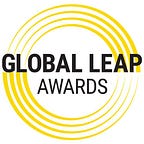The Global LEAP Awards are an international competition to identify and promote the world’s best, most energy-efficient off-grid appliances. In 2019, the Global LEAP Awards launched the inaugural Solar E-Waste Challenge to identify innovations in solar e-waste management across sub-Saharan Africa. Through a rigorous evaluation process, the competition selected eight winners spanning five countries to implement projects in take-back and collection, consumer awareness, and product recycling & reuse. This blog series highlights the solar e-waste ecosystems where each company is operating.
Creating a formal e-waste recycling ecosystem in Nigeria seems almost an impossible task. Labelled the e-waste capital of Africa, over half a million tonnes of discarded appliances are processed in Nigeria every year, threatening both the health of the robust informal recycling industry and the expansive natural environment of the most populous country in sub-Saharan Africa.
Global LEAP Solar E-Waste Challenge Winner Hinckley Recycling is the first legally registered e-waste recycler in the country, with ambitious goals to bring together government, formal and informal recycling stakeholders.
However, one of the greatest challenges the company faces is coordinating efforts with the vast informal sector: “I would guess that 99% of e-waste in Nigeria is processed by the informal sector. The difference between them [informal sector] and us [formal sector] is that they have not been processing materials in a responsible and environmentally safe way,” explained Adrian Clews, Managing Director at Hinckley.
“We are incurring costs by processing all components and materials, while collectors cherry pick the valuable components and metals and sell them on.” Hinckley Recycling is competing against an extensive, highly organized nationwide scrap dealers’ coalition. “In the West, we have an image of those guys in dumpsites pushing cars filled with various materials, like scrap metals, electronics, and other items mixed in there.
According to UN Environment, up to 100,000 people work in the informal electronic waste sector in Nigeria. Each of those individuals is a member of a highly-organized network. At the head of the network is the president who coordinates these collectors nationwide.” The largest scrap collector association in Nigeria is called Scrap Dealers Association of Nigeria (SDAN) and hosts over ten thousand members.
The market is regulated by a president and a managing team, broken down into regions and sub-regions. The president and his associates communicate with members primarily through social media outlets such as Facebook and WhatsApp. The inter-country informal e-waste management market is generally conducted in popular outdoor markets where individuals operate small shops.
Informal collectors bring components with potential value to these locations, materials are weighed, and cash is paid on site. A whole seller or whole sale buyer collects materials in large containers to transport to domestic smelting facilities. Materials that cannot be processed or smelted locally, like PCB, are purchased and exported by Asian buyers to Southeast Asia and East Asia.
This system poses significant risks to human and environmental health: “The issue with this informal system is that the collectors are not worried about their health, they are purely making a daily living from collecting and selling the materials. They won’t wear gloves or nose masks. They don’t have medical check-ups even though they are routinely exposed to pretty horrendous chemicals. For example, when extracting copper from CRT monitors they will take a hammer and smash the leaded glass, expose themselves to the lead, smash the yoke. This method poses an immediate risk for their health but also to the wider environment.”
The National Environmental Standards and Regulations Enforcement Agency (NESREA) is the government arm responsible for implementation of e-waste regulation in Nigeria, but they operate under very limited legislation, power, and resources. NESREA have offices across the country with teams that visit popular informal collection sites and attempt to close them down. However, due to lack of resources, these sites can easily pop up a day later or move to a nearby site to resume activities.
In addition to NESREA, each state has their own enforcement agency. In Lagos state, there is the Lagos State Environmental Protection Agency (LASEPA) with limited resources to enforce e-waste management laws across a Nigeria’s largest state.
In Lagos, a city of an estimated 21 million inhabitants, there are 5–10 individuals expected to enforce e-waste guidelines, regulations and legislation. “It’s a challenging task,” claims Clews.
Despite the seemingly endless heaps of electronic waste in Lagos, Hinckley is struggling to access enough e-waste to make their business model viable: “the volumes that we recycle are very low because we simply cannot compete with the informal recyclers.” But through the Solar E-Waste Challenge, Hinckley is innovating on ways to engage the informal sector to establish a mutually beneficial relationship.
Find out more on Hinckley’s Solar E-Waste Challenge project.
